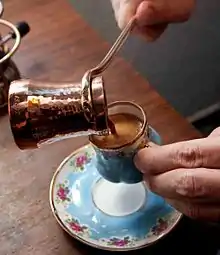Cezve
A cezve (Turkish: cezve, Arabic: جَِذوة) is a small long-handled pot with a pouring lip designed specifically to make Turkish coffee. It is traditionally made of brass or copper, occasionally also silver or gold. In more recent times cezveler are also made from stainless steel, aluminium, or ceramics.

Name
The name cezve is of Turkish origin, where it is a borrowing from Arabic: جَِذوة (jadhwa or jidhwa, meaning ember).
Other regional variations of the word cezve are jezve, čezve, and xhezve. In Ukrainian and Russian the word is spelled джезва (where it exists alongside турка, IPA: [ˈturkə]). In Bosnia and Herzegovina, Serbia, Montenegro, Croatia, Slovenia, Slovakia, North Macedonia, and the Czech Republic, it is a long-necked coffee pot, spelled džezva.
Other names
- In Greece the pot is called briki (Greek: μπρίκι), a borrowed word from Arabic. The Greek name is also used in English-speaking countries such as the United States and Australia because of their large Greek diasporic populations.
- In Macedonian: ѓезве (ǵezve)
- In Armenian: ջազվե (jazve) or սրճեփ (srčep),
- In Bosnian: džezva
- In Bulgarian: джезве (IPA: [dʑɛzvɛ]) and кафеник (IPA: [kafeník])
- In Cypriot Greek: the device is called briki (Greek: μπρίκι) or τζιζβές (IPA: [dz̺uzˈvɛ])
- In Hebrew, the pot is called ג'זווה (jezwa). the vessel is commonly known as פִינְגָ'אן, IPA: [findʑan] (finjan), a name derived from the Arabic term for a small serving cup.
- In Albania: xhezve; coffee made in this manner is very popular there.
- In Levantine Arabic: ركوة (rakwa, rakwé)[1][2]
- In Tunisian Arabic: ززوة (zezwa)
- In Egyptian Arabic: كنكة (kanaka)
- In Palestinian Arabic: غلاية (ghallāya)
- In Poland it is known as dżezwa, though the word is not widespread. Recently the word findżan is also in use in some cafés.
- In Russian: турка, джезва, (IPA: [ˈturkə])
- In Ukrainian: джезва
- In Belarusian: джэзва
- In Romanian: ibric
- In Serbian: џезва / džezva
- In the rest of the world, the cezve is known as an ibrik, which is also its most common name in the United States, just like in Romania. Ibrik is a Turkish word from Arabic إبريق (ʿibrīq), from Aramaic ܐܖܪܝܩܐ (ʾaḇrēqā), from early Modern Persian *ābrēž (cf. Modern Persian "ābrēz"), from Middle Persian *āb-rēǰ, ultimately from Old Persian *āp- 'water' + *raiča- 'pour' (cf. Modern Persian & Middle Persian ریختن[rêxtan]).[3][4] In Turkish an ibrik is not a coffee-pot, but simply a pitcher or ewer.
Gallery
 Copper cezve with Turkish coffee pouring out.
Copper cezve with Turkish coffee pouring out. Utensils to prepare Turkish coffee (handmade from Crete). A cezve is at the bottom.
Utensils to prepare Turkish coffee (handmade from Crete). A cezve is at the bottom.
See also
- Dallah (Arabic coffee pot)
- Jebena (Ethiopian coffee pot)
- Arabic coffee
- Turkish coffee
- List of cooking vessels
References
- Shadid, Anthony (2012). House of Stone: A Memoir of Home, Family, and a Lost Middle East. Houghton Mifflin Harcourt. ISBN 978-0-547-13466-6., page 24.
- see also Hans Wehr Dictionary of Modern Written Arabic --- rakwa page 416.
- Steingass, Francis Joseph (1992). A Comprehensive Persian-English Dictionary: Including the Arabic Words and Phrases to be Met with in Persian Literature, Being, Johnson and Richardson's Persian, Arabic, and English Dictionary, Revised, Enlarged, and Entirely Reconstructed. Asian Educational Services. ISBN 978-81-206-0670-8. page 8.
- https://www.google.com/books/edition/Arabic_in_Context/cuEzDwAAQBAJ?hl=en&gbpv=1&dq=%C4%81br%C4%93z&pg=PA320&printsec=frontcover&bsq=%C4%81br%C4%93z
